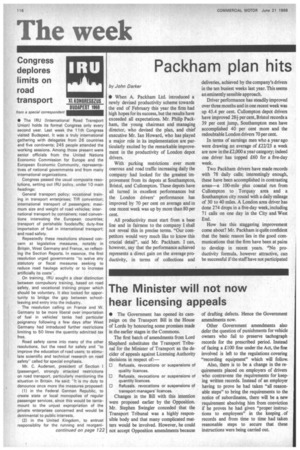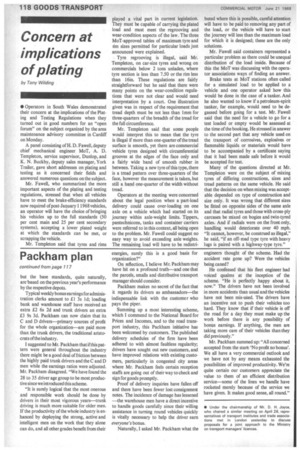Packham plan hits
Page 118

Page 120

If you've noticed an error in this article please click here to report it so we can fix it.
by John Darker
• When A. Packham Ltd. introduced a newly devised productivity scheme towards the end of February this year the firm had high hopes for its success, but the results have exceeded all expectations. MT. Philip Packham, the young • chairman and managing director, who devised the plan, and chief executive Mr. Ian Howard, who has played a major role in its implementation are particularly excited by the remarkable improvement in the productivity of London depot drivers.
With parking restrictions ever more onerous and road traffic increasing daily the company had looked for the greatest improvement from its depots at Southampton, Bristol, and Cullompton. These depots have all turned in excellent performances but the London drivers' performance has improved by 70 per cent on average and in one recent week was up by more than 80 per cent.
All productivity must start from a base line and in fairness to the company I shall not reveal this in precise terms. "Our competitors would very much like to know this crucial detail", said Mr. Packham. I can, however, say that the performance achieved represents a direct gain on the average productivity, in terms of collections and deliveries, achieved by the company's drivers in the ten busiest weeks last year. This seems an eminently sensible approach.
Driver performance has steadily improved over three months and in one recent week was up 45.4 per cent. Cullompton depot drivers have improved 281 percent, Bristol records a 39 per cent jump, Southampton men have accomplished 40 per cent more and the redoubtable London drivers 70 per cent.
In terms of earnings men who a year ago were drawing an average of £22/23 a week are now in the £2,000 a year category; indeed one driver has topped £60 for a five-day week.
Two Packham drivers have made records with 78 daily calls; interestingly enough, these have been accomplished in contrasting areas—a 100-mile plus coastal run from Cullompton to Torquay area and a Southampton city round with a daily mileage of 30 to 40 miles. A London area driver has done 274 drops in a five-day week, including 71 calls on one day in the City and. West End.
How has this staggering improvement come about? Mr. Packham is quite confident that the basic reason lies in the good communications that the firm have been at pains to develop in recent years. "No productivity formula, however attractive, can be successful if the staff have not participated but the base standards, quite naturally, are 'based on the previous year's performance by the respective depots.
Typical weekly bonus earnings for administration clerks amount to £1 35 Id; loading bank and warehouse staff have received an extra £2 bs 2d and trunk drivers an extra £3 9s 3d. Packham can now claim that its C and D drivers—primary sources of profit for the whole organization—are paid more than the trunk drivers, the traditional aristocrats of the industry.
I suggested to Mr. Packham that if this pattern were general throughout the industry there might be a good deal of friction between the highly paid trunk drivers and the C and D men while the earnings ratios were adjusted. Mr. Packham disagreed. "We have found the 28 to 35 driver age group to be most productive since we introduced this scheme.
"It is surely logical that the most onerous and responsible work should be done by drivers in their most vigorous years—trunk driving is much more suitable for older men. If the productivity of the whole industry is enhanced by deploying the strong, active and intelligent men on the work that they alone can do, and all other grades benefit from their
energies, surely this is a good basis for organization?"
On reflection, I believe Mr. Packham may have hit on a profound truth—and one that the parcels, smalls and distributive transport manager should consider.
Packham makes no secret of the fact that it regards its drivers as ambassadors—the indispensable link with the customer who pays the piper.
Summing up a most interesting scheme, which I commend to the National Board for Prices and Incomes, and to the road transport industry, this Packham initiative has been welcomed by customers. The published delivery schedules of the firm have been adhered to with almost faultless regularity; drivers have sought out new customers, and have improved relations with existing customers, particularly in congested city areas where Mr. Packham feels certain reception staffs are going out of their way to check and sign for goods promptly.
Proof of delivery inquiries have fallen off and there have been fewer lost consignment notes. The incidence of damage has lessened —the warehouse men have a direct incentive to handle goods carefully since their willing assistance in turning round vehicles quickly is vitally necessary to help the driver earn everyone's bonus.
Naturally, I asked Mr. Packham what the engineers thought of the scheme. Had the accident rate gone up? Were the vehicles being caned?
He confessed that his fleet engineer had voiced qualms at the inception of the scheme. "He is perfectly happy about it, now." The drivers have not been involved in more accidents than usual and the vehicles have not been mis-used. The drivers have an incentive not to push their vehicles too hard. They know that if their vehicle is off the road for a day they must make up the work before there is any possibility of bonus earnings. If anything, the men are taking more care of their vehicles than they did previously."
Mr. Packham summed up: "All concerned accepted from the start; 'No profit no bonus'. We all have a very commercial outlook and we have not by any means exhausted the possibilities of improved productivity. We're quite certain our customers appreciate the value to them of an efficient distribution service—some of the lines we handle have rocketed merely because of the service we have given. It makes good sense, all round."
• Under the chairmanship of Mr. D. I-I. Joyce, who chaired a similar meeting on April 26, representatives of transport institutes and trade associations met in London yesterday to discuss proposals for a joint approach to the Ministry on transport managers' licences.








































































































































































































